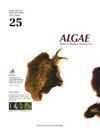淡水硅藻nizschia palea HY1的分离和培养提高生物量和岩藻黄素产量
IF 2.4
3区 生物学
Q1 MARINE & FRESHWATER BIOLOGY
引用次数: 0
摘要
硅藻是一种分布在世界各地的微藻,已被确定为生物质、脂质和高价值化合物的潜在来源。虽然海洋硅藻已被广泛研究,但淡水硅藻的潜力仍有待探索。本文从韩国首尔junnangcheon溪流(37°33′08.0”N, 127°02′40.0”E)中分离到了一株淡水硅藻,并对其进行了系统发育分析和光镜、电镜观察;它被命名为古氏耐氏菌HY1。与传统硅藻培养基相比,在淡水培养基(FDM)中生长的N. palea HY1生物量(0.68 g L<sup>-1</sup>)和岩藻黄质产量(9.19 mg L<sup>-1</sup>)更高。当碳酸氢盐浓度从2 mM增加到10 mM时,FDM的最大生物量和岩藻黄素产量分别提高了2.7倍和1.5倍。值得一提的是,改良FDM (MFDM)的曝气处理显著提高了N. palea HY1的最大生物量和岩藻黄素产量,分别比FDM提高了3.8倍和4.1倍。这些结果表明,利用MFDM优化古褐藻多糖的培养可以替代海洋来源生产岩藻黄质。本文章由计算机程序翻译,如有差异,请以英文原文为准。
Isolation and cultivation of freshwater diatom Nitzschia palea HY1 for increasing biomass and fucoxanthin production
Diatoms, a type of microalgae distributed worldwide, have been identified as potential sources of biomass, lipids, and high-value compounds. While marine diatoms have been extensively studied, the potential of freshwater diatoms still needs to be explored. In this study, a novel strain of freshwater diatom was isolated from the Jungnangcheon stream located in Seoul, Republic of Korea (37°33'08.0" N, 127°02'40.0" E). This newly isolated strain was classified through phylogenetic analysis, and its morphology was investigated using light and electron microscopy; it was named Nitzschia palea HY1. N. palea HY1 grown in freshwater media (FDM) produced higher biomass (0.68 g L-1) and fucoxanthin production (9.19 mg L-1) than in conventional diatom media. Furthermore, increasing the bicarbonate concentration from 2 to 10 mM enhanced the maximum biomass and fucoxanthin production in FDM by 2.7 fold and 1.5 fold, respectively. Remarkably, the introduction of aeration to the modified FDM (MFDM) led to a substantial increase in the maximum biomass and fucoxanthin production of N. palea HY1, exhibiting 3.8-fold and 4.1-fold enhancement, respectively, compared to FDM alone. These findings suggest that optimizing the cultivation of N. palea HY1 using MFDM could provide an alternative to marine sources for fucoxanthin production.
求助全文
通过发布文献求助,成功后即可免费获取论文全文。
去求助
来源期刊

Algae
PLANT SCIENCES-
CiteScore
5.10
自引率
25.00%
发文量
18
期刊介绍:
ALGAE is published by the Korean Society of Phycology and provides prompt publication of original works on phycology. ALGAE publishes articles on all aspects of phylogenetics and taxonomy, ecology and population biology, physiology and biochemistry, cell and molecular biology, and biotechnology and applied phycology. Checklists or equivalent manu-scripts may be considered for publication only if they contribute original information on taxonomy (e.g., new combinations), ecology or biogeography of more than just local relevance. Contributions may take the form of Original Research Articles, Research Notes, Review Articles and Book Reviews.
 求助内容:
求助内容: 应助结果提醒方式:
应助结果提醒方式:


